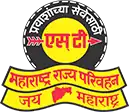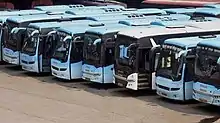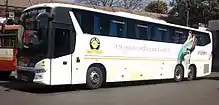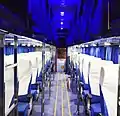Maharashtra State Road Transport Corporation
The Maharashtra State Road Transport Corporation abbreviated as (MSRTC, or simply ST),[9] is the state run bus service of Maharashtra, India which serves routes to towns and cities within Maharashtra as well as to its adjoining states. It has a fleet strength of 18,449 buses. It also offers a facility for online booking of tickets for all buses.[10] Recently From 21 May 2020, the Corporation Started Goods Transportation, Private Bus Body Building, Private Vehicle Tyre Remoulding.[11] In future, Corporation plans to start petrol pump for private vehicles all over the Maharashtra.[12]
 Motto: "प्रवाशांच्या सेवेसाठी" (transl. For passenger service) | |
Native name | महाराष्ट्र राज्य मार्ग परिवहन महामंडळ |
|---|---|
| Formerly | Bombay State Road Transport Corporation (BSRTC)[1] |
| Industry | Public transport bus service |
| Founder | Government of Maharashtra |
| Headquarters | MSRTC Building, Dr. Anandrao Nair Marg, Mumbai Central, Mumbai, 400 008[2] |
Area served | Maharashtra |
Key people | Eknath Shinde (President and State transport minister)[3][4] Shekhar Channe (Vice President and Managing Director)[5] |
| Brands | |
| Services |
|
| Owner | Government of Maharashtra |
Number of employees | 1,02,000 employees |
| Website | Maharashtra State Road Transport Corporation |
| Footnotes / references 18,449-odd buses serve 67 lakh passengers per day | |
History
The Maharashtra State Road Transport Corporation was established by the State Government of Maharashtra as per the provision in Section 3 of RTC Act 1950. The MSRTC operates its services by the approved scheme of road transport published vide Notification MVA 3173/30303-XIIA dated 29 November 1973 in the official gazette. The area covered by the scheme is the entire area of the state of Maharashtra. The undertaking is operating stage and contract carriage services in the entire area of the state of Maharashtra except S.T. undertaking defined under Section 68 A (b) of M. V. Act and other exceptions published in the scheme. The first bus was flagged off from Pune to Ahmednagar in 1948.[13][14]
Tracing the history that saw this development, we go back to the 1920s; when various entrepreneurs started operations in the public transport sector. Till the Motor Vehicle Act came into being in 1939, there were no regulations monitoring their activities which resulted in arbitrary competition and unregulated fares. The implementation of the Act rectified matters to some extent. The individual operators were asked to form a union on defined routes in a particular area. This also proved to be beneficial for travelers as some sort of schedule set in; with a time table, designated pick-up points, conductors, and fixed ticket prices. This was the state of affairs till 1948, when the then Bombay State Government, with the late Morarji Desai as the home minister, started its own state road transport service, called State Transport Bombay. And, with this, the first blue and silver-topped bus took off from Pune to Ahmednagar.[13][14]
There were 10 makes of buses in use then – Chevrolet, Ford Motor Company, Bedford Vehicles, Seddon Atkinson, Studebaker, Morris Commercial, Albion Motors, Ashok Leyland, Commer and Fiat. In the early 1950s, two luxury coaches were also introduced with Morris Commercial Chassis. These were called Neelkamal and Giriyarohini and used to ply on the Pune-Mahabaleshwar route. They had two by two seats, curtains, interior decoration, a clock, and green tinted windows.[13][14]
In 1950, a Road Transport Corporation Act was passed by the Central Government which delegated powers to states to form their individual road transport corporations with the Central Government contributing one-third of the capital. The Bombay State Road Transport Corporation (BSRTC) thus came into being, later changing its name to MSRTC with the re-organization of the state.[13][14]
The ST started with 30 Bedford buses having wooden bodies, coir seats. The fare charged on the Pune-Nagar route was nine paisa. With time, the S.T. buses underwent many changes, including increasing the seating capacity from the original 30 to 45 to the present 54, introduction of all-steel bodies to replace wooden bodies to make them stronger and cushion seats for more comfort. Later, in 1960, aluminium bodies were introduced as steel corrodes, especially in coastal areas, and the colour code also changed to red from the blue and silver. A partial night service was launched in 1968; the overnight service about a decade later and the semi-luxury class came into being during the 1982 Asian Games.[13][14]
The S.T. buses are also used for transportation of the postal mail, distribution of medicines, newspapers and even tiffins sent by people from rural areas to their relatives in cities. They also are used to transport agricultural goods to cities.[14]
Fleet
| Bus Type | No.of Bus |
|---|---|
| Ordinary Bus | 12700 |
| City Bus | 100 |
| Semi Luxury(Hirakani) | 450 |
| Midi Bus | 30 |
| Shivneri-Ashwamedh | 110 |
| Shivshahi AC Seater | 1070 |
| Ordinary Sleeper Seater | 200 |
| Shivai Electric | 10 |
MSRTC is operating a fleet of approximately 15,512 buses that ferry 8.7 million passengers daily.[13]

The Ordinary, Parivartan, Asiad and City Buses are built at MSRTC's in-house workshops at Pune city, Aurangabad, and Nagpur on Ashok Leyland and TATA chassis. These workshops produce as many as 20,000 buses per year on average. The corporation has nine tyre retreading plants along with 32 divisional workshops.[15] The Shivneri air conditioned bus service consists of Volvo 9400R and Scania Metrolink buses.[16] The Shivshahi buses are air-conditioned luxury buses which are operated by MSRTC and some private contractors.[17]
In 2018, MSRTC added approximately a 1,000 special non-AC Vithai buses, which were introduced to ferry passengers to the pilgrim town of Pandharpur in Solapur district. They have a seating capacity of 45 seats and a similar design to that of 'Parivartan' buses.[18]
In 2019,the MSRTC introduced new non-air conditioned buses with beds and recliner chairs specially designed for long overnight routes. Extra facilities like reading lamp, night lamp, charging point, fan and two huge storage compartments have also been provided.[19]
MSRTC’s first electric bus 'Shivai' that plies from Pune to Ahmednagar was flagged from Pune in presence of the then Deputy Chief Minister Ajit Pawar and the then state Transport Minister Anil Parab on 1 June 2022. MSRTC would get 50 electric buses in July 2022 which will be deployed from Pune to four cities — Nashik, Solapur, Kolhapur and Sambhajinagar.
Services
Ashwamedh

List of Bus Depots, Bus Stands & Traffic Controll Cells
| Mumbai | Pune | Nashik | Ch. Sambhajinagar | Amaravati | Nagpur |
|---|---|---|---|---|---|
| Mumbai | Pune | Nashik | Ch. Sambhajinagar | Amaravati | Nagpur |
| Palghar | Kolhapur | Jalgaon | Beed | Akola | Bhandara |
| Thane | Sangli | Dhule | Nanded | Buldhana | Chandrapur |
| Raigad | Satara | Ch. Sambhajinagar | Parbhani | Yavatmal | Wardha |
| Ratnagiri | Solapur | Jalna | |||
| Sindhudurg | Dharashiv | ||||
| Latur |
NathJal
MSRTC, on Monday, November 2, 2020, has launched 'Nathjal' with a focus to provide low-cost and pure potable water to the commuters. The bottled water will be available at the bus stations for INR 10 and 15, and a private company based out of Pune has been selected for bottled water supply. The new initiative was inaugurated by Transport Minister and President of ST Corporation Adv. Anil Parab.
The corporation plans to sell the drinking water at every bus stand of the corporation. Talking about the same, he said, "The bottled water of other companies cannot be sold on ST stands. The MSRTC has taken the responsibility of making quality water available to the passengers at affordable rates." Over the decades, Maharashtra has seen a great tradition of Warkari sector, whereby the Guru is called 'Nath'. Sharing more, Minister Parab said that the official bottled drinking water being named 'Nathjal' is a moment of honour for Maharashtra.
Which aims to increase its revenue.
2021–22 strike
During the COVID-19 lockdown in India which started in March 2020, MSTRC was unable to process salaries of employees for many months. Salaries of nearly 90,000 employees were held up for 3–4 months, leading to few employees committing suicides finding it difficult to meet their needs. Employees put in various demands in front of the then Maharashtra government; like pay hike, remunerations for losses and also to consider merger of MSTRC with state government by which benefits of state government would get extended to the employees of MSTRC. With failure to reach any conclusion on demands; over 92,600 employees of MSTRC went on strike from 27 October 2021.[20][21][22]
Gallery
 ASHWAMEDH - AC RECLINER
ASHWAMEDH - AC RECLINER ASHWAMEDH SCANIA -AC RECLINER
ASHWAMEDH SCANIA -AC RECLINER SHIVNERI - AC RECLINER
SHIVNERI - AC RECLINER REGULAR PARIVARTAN BUS #LALPARI#
REGULAR PARIVARTAN BUS #LALPARI# VITHAI BUS
VITHAI BUS SHIVAI ELECTRIC BUS
SHIVAI ELECTRIC BUS BHIMASHANKAR TOURISM BUS
BHIMASHANKAR TOURISM BUS SHITAL BUS
SHITAL BUS NEW MG BUSES
NEW MG BUSES ROYAL SLEEPER+SEATER
ROYAL SLEEPER+SEATER SLEEPER+SEATER MG BUS
SLEEPER+SEATER MG BUS SHIVSHAHI - AC RECLINER
SHIVSHAHI - AC RECLINER HIRKANI SEMI-LUXURIOUS
HIRKANI SEMI-LUXURIOUS YASHWANTI BUS
YASHWANTI BUS ASIAD SEMI-LUXURIOUS
ASIAD SEMI-LUXURIOUS_Bus.jpg.webp) A Ratnagiri - Latur Parivartan (2×2) Bus (Ordinary Express)
A Ratnagiri - Latur Parivartan (2×2) Bus (Ordinary Express) A Mumbai-Kolhapur semi-luxury sleeper bus
A Mumbai-Kolhapur semi-luxury sleeper bus
References
- "Maharashtra State Road Transport Corporation history". MSRTC. 29 January 2023.
- "ST headquarters address". MSRTC.
- "Secretarial Branch, Maharashtra State Road Transport Corporation". MSRTC.
- "Sharad Pawar, Anil Parab fail to get MSRTC employees to give up on strike". Hindustan Times. 29 January 2023.
- "Maharashtra State Road Transport Corporation Information". MSRTC. 29 January 2023.
- "MSRTC service bus". MSRTC.
- "Mumbai: 200 new 'Hiraknis' to serve ST passengers; Will enter the fleet by March 2023". Loksatta. 20 December 2022.
- "'Vithai' of warkars joined ST fleet from today". Zee News. 24 December 2018.
- Sitaram, Mewati (29 December 2014). "Soon, computer-aided training for MSRTC drivers". Daily News and Analysis. Mumbai. Retrieved 31 May 2015.
- ":: MSRTC :: Online Reservation System". Public.msrtcors.com. Retrieved 25 July 2012.
- "The Maharashtra State Road Transport Corporation". msrtc.maharashtra.gov.in.
- "Maharashtra MSRTC to set up petrol pumps to increase earnings, overcome losses". Deccan Herald. 19 August 2020. Retrieved 21 April 2021.
- "History of MSRTC". msrtc.maharashtra.gov.in. Retrieved 8 February 2019.
- Ghumare, S V (2011). "1" (PDF). A critical study of organisation and management of Maharashtra State road transport corporation (1992 to 93 to 2002 to 03) (Thesis). Savitribai Phule Pune University. Retrieved 28 July 2019.
- "MSRTC Fleet". MSRTC. Retrieved 28 July 2019.
- "MSRTC's new fleet of luxury buses scheduled to hit city roads by Diwali". The Times of India. 29 September 2015. Retrieved 28 July 2019.
- Sengupta, Joy (17 December 2019). "Surprise checks of Shivshahi buses run by private contractors". The Times Of India. TNN. Retrieved 24 March 2020.
- "MSRTC adds Vithai buses to its fleet". The Times of India. 30 December 2018. Retrieved 28 July 2019.
- Bhale, Rasika (20 November 2019). "MSRTC to operate 200 sleeper buses on 16 routes in State". The Hindu. Retrieved 24 March 2020.
- Ozarkar, Vallabh (9 April 2022). "Explained: Why MSRTC employees are on strike, and what led to protests outside Sharad Pawar's house". Indian Express. Mumbai. Retrieved 25 April 2022.
- Ozarkar, Vallabh (8 February 2022). "As MSRTC strike crosses 100 days, meet some of those holding ground". Indian Express. Retrieved 25 April 2022.
- Sodhi, Tanishka (21 January 2022). "Behind MSRTC strike: Suicides, terminations, court battles and low salaries". News Laundry. Retrieved 25 April 2022.